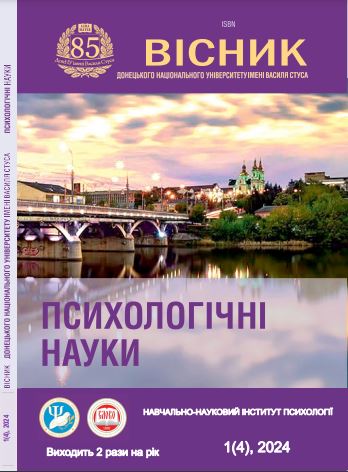Psychological characteristics of the identity of rescuers with signs of post-traumatic stress disorder
DOI:
https://doi.org/10.31558/2786-8745.2024.1(4).8Keywords:
post-traumatic stress disorder, identity, rescuers, psychological characteristics, professional activityAbstract
The article highlights the results of a study on the psychological characteristics of the identity of rescuers who show signs of post-traumatic stress disorder (PTSD). The identity of rescuers is formed based on their personal experience, self-perception in the profession, assessment of their competence, as well as social interaction in the work collective. However, PTSD symptoms can significantly affect the identity of rescuers, leading to its destabilization. Among the key issues that arise as a result of PTSD are alienation from colleagues, doubts about their professional capabilities, as well as an acute sense of loss of control over their life and professional activities.
PTSD develops in individuals who have experienced traumatic events. It distorts the course of a person's mental activity. The general symptoms of PTSD include a shortened life perspective, prolonged activation of combat stress, aggressiveness, conflict-proneness, social maladaptation, and disruptions in social and personal identity. PTSD is not only a personal issue for the rescuer but also a pressing societal concern, as its manifestations are, in part, generated by public opinion and the population's attitude toward emergency situations.
Significant identity disruptions have been identified in rescuers who display PTSD symptoms. These are manifested in emotional polarization, instability of self-esteem, loss of confidence in their competence, and reduced motivation for active professional activity. The article emphasizes that traumatic experiences can lead to a loss of professional role identity and alienation from the team, which negatively affects work efficiency and the overall psychological well-being of rescuers. Timely psychological interventions can help maintain the stability of rescuers' identity and preserve their professional health.
References
Актуальні дослідження в сучасній вітчизняній екстремальній та кризовій психології : монографія / за заг. ред. В. П. Садкового, О. В. Тімченка. Харків : ФОП Мезіна В.В., 2017. 512 с.
Афанасьєва Н. Є., Маклакова С. С. Професійна ідентичність рятувальників України. Теорія і практика сучасної психології. 2018. № 4. С. 191–196.
Бабелюк О. В., Гоцуляк Н. Є. Психологічна служба рятувальних підрозділів : навчально-методичний посібник. Кам’янець-Подільський : ТОВ «Друкарня «Рута», 2021. 204 с.
Васильєв С. П., Зубовський Д. С. Психодіагностика посттравматичного стресового розладу у військовослужбовців. Український психологічний журнал. 2016. № 1. С. 6–16.
Вересова В. Д., Абаніна Г. В. Проблема професійної ідентичності в контексті феномену психологічного благополуччя. Актуальні питання сучасної науки та практики: матеріали науково-практичної конференції, м. Київ, 15 листопада 2018 р. Київ, 2018. С. 499–501.
Корольчук О. Л. Посттравматичний стресовий розділ як новий виклик сучасній Україні. Державне управління. Інвестиції: практика та досвід. 2016. № 17. С. 104–111.
Назар Ю. О. Посттравматичне зростання в контексті моделей благополуччя особистості. Габітус. 2023. Вип. 48. С. 125–131.
Назаров О. Психологія діяльності рятувальника: зміст та проблеми для обговорення. Проблеми екстремальної та кризової психології. 2022. №2(4). С. 30–38.

